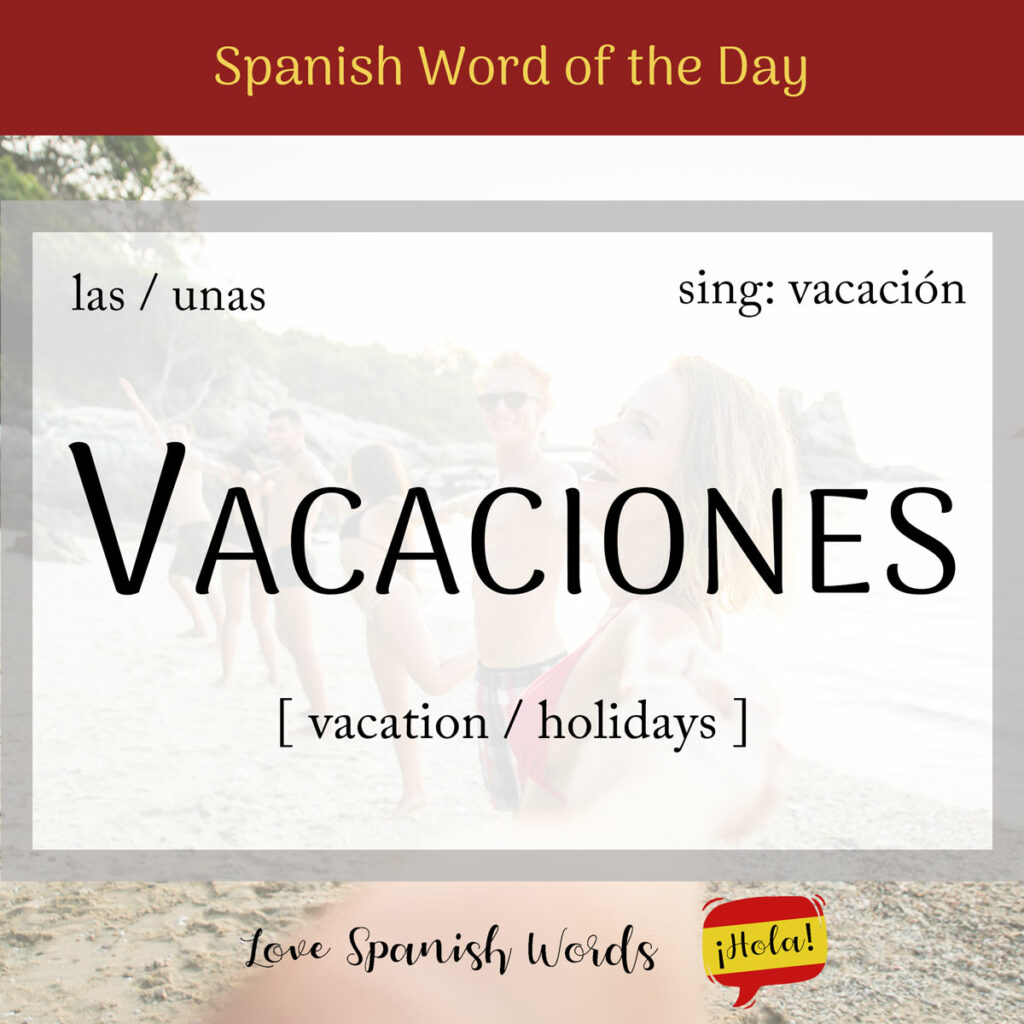Going on holiday is the moment we all eagerly anticipate each year: the Spanish word for holiday or vacation is vacaciones.
The length and timing of vacaciones vary depending on the country. However, across all Spanish-speaking nations, you’ll find that the key holiday periods are Summer, Christmas, and Easter.
Latin American Pronunciation
European Pronunciation

The origin of vacaciones is from the Latin word vacatio and the verb vacare which Romans used to describe the state of being free, not busy or empty.
It’s important to note that vacaciones is typically used in the plural form to refer to vacation or holidays, and there is no common singular form. While you could technically say vacación, it’s very rare and usually used in specific contexts like legal or formal documents in some Latin American countries. In everyday conversation, the plural vacaciones should be your go-to word, even when referring to a single vacation.
- las vacaciones = the holidays
- unas vacaciones = some holidays
¿A dónde vas a ir en las vacaciones de verano?
Where are you going on the summer holidays?
The number of vacation days you’re entitled to varies depending on the country you live in. In Spain and Peru, the minimum is 30 days per year, whereas in Venezuela and Colombia, it’s just 15! However, in most South American countries, the amount of holiday time increases the longer you’ve been working for the same employer—the more years, the more vacation days you earn.
Este año tengo tres semana de vacaciones
This year I have three weeks of holidays.
¿Cuántas vacaciones tienes?
How many holidays have you got?

Summer holidays are in the summer!
Don’t forget that in some Spanish speaking countries, the school summer holidays are between June and August while in others, they occur between December and February. Depending on the country, they may be one, two or even three months long!

In Spain, August is el mes más caluroso del año (the hottest month of the year) and it is the traditional mes de vacaciones (holiday month) when many public services and shops close and cities empty out as people head to the coast.
Madrid está vacío durante las vacaciones de verano.
Madrid is empty during the summer holidays.
While some prefer pasar las vacaciones (to spend their holidays) in their own country, others may decide viajar al extranjero (to travel abroad) in order to escape los días de calor (the hot days) or to experience life in another country.
The most common way to use vacaciones in a sentence is, of course, Me voy de vacaciones (I am going on a holiday).
After a long tiring day you may want to say ¡Necesito unas vacaciones! (I need a holiday!).

Bank holidays
Interestingly, a bank holiday in Spanish is un día de fiesta (which literally means a day of party), un día feriado (a fun fair day) or un día festivo (a festive day).
When a public holiday falls on a Tuesday or Thursday, an extra day off might be granted on the adjacent Monday or Friday, creating a puente (bridge) and resulting in a long weekend or un fin de semana largo.
Este año la fiesta de la Constitución cae en Jueves y el Viernes tenemos puente. = This year the Constitution bank holiday falls on Thursday and on Friday we have “bridge”.
Where shall we go?
Typical holidays and their destinations in Spanish include:
- vacaciones en la playa = beach holidays
- vacaciones en la costa = coastal holidays
- vacaciones en el campo = holidays in the countryside
- vacaciones con la familia =family holidays
- vacaciones de Verano = Summer holidays
- vacaciones de Navidad = Christmas holidays
- vacaciones de Semana Santa = Easter holidays
- vacaciones de fin de semana largo = long weekend break
Me encanta ir de vacaciones a la montaña.
I love going on holiday to the mountains.
Sevilla es muy bonita en las vacaciones de Semana Santa.
Sevilla is very beautiful during the Easter holidays.


